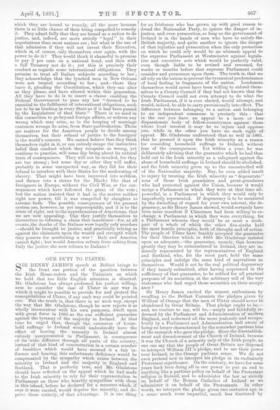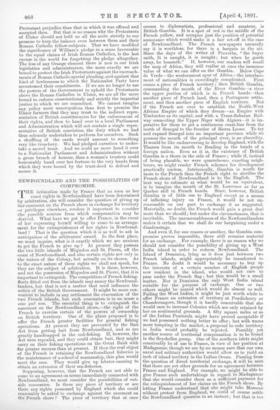OUR DUTY TO ULSTER, S IR HENRY JAMES'S speech at Belfast
brings to the front one portion of the question between the Irish Home-rulers and the Unionists on which we hold that too little English attention is directed. Mr. Gladstone has always professed his perfect willing- ness to consider the case of Ulster in any way in which it might be possible to provide for and protect the susceptibilities of Ulster, if any such way could be pointed out. But the truth is, that there is no such way, except the way that Mr. Gladstone, though he now rejects it as wholly inconsistent with his own purposes, dwelt upon with great force in 1885 as the one sufficient guarantee against the tyranny of the majority in Ireland. At that time he urged that, though the, extension of house- hold suffrage to Ireland would undoubtedly have the effect of leaving the minority in Ireland almost entirely unrepresented in Parliament, in consequence of its wide diffusion through all parts, of the country, instead of that kind of concentration in a certain number of localities which would have secured it a fair in- fluence and hearing, this unfortunate deficiency would be compensated by the sympathy which exists between the minority in Ireland and the majority in England and Scotland. That is perfectly true, and Mr. Gladstone should have reflected on the appeal which he had made to the Irish minority to rely for their representation in Parliament on those who heartily sympathise with them in this island, before he declared for a measure which, if ever it were carried, would deprive the minority, and de- prive them entirely, of that advantage. It is one thing for an Irishman who has grown up with good. reason to dread the Nationalist Party, to ignore the danger of in- justice, and even persecution, so long as the government of Ireland is in the hands of men who have to satisfy the British majority, and quite another to ignore the danger of that injustice and persecution when the only protection on which he could rely would be an ultimate appeal to the supreme Parliament at Westminster against legisla- tive and executive acts which would be perfectly valid, even though liable to be revised and reversed, for weeks or months before that supreme Parliament could consider and pronounce upon them. The truth is, that we all rely on the nation to prevent the tyrannical predominance of local feeling in fragments of the nation. Londoners themselves would never have been willing to submit them- selves to a County Council if they had not known that the County Council could not even attempt to do what the Irish Parliament, if it is ever elected, would attempt, and would, indeed, be able to carry provisionally into effect. The difference between belonging to a nation and belonging to an independent commune is precisely this : that in the one you have an appeal to a more or less dispassionate body of fellow-countrymen against those whose local interest it may be to injure and oppress you, while in the other you have no such right of appeal. Mr. Gladstone understood that so well in 1885, that he pressed it upon the Irish minority as a reason for conceding household suffrage to Ireland, without fear of the consequences. Yet within a year, he was deliberately advising that the guarantee which he had thus held out to the Irish minority as a safeguard against the abuse of household suffrage in Ireland should be abolished, and the Irish minority given up to the uncontrolled will of the Nationalist majority. Nay, he even added insult to injury by treating the Irish minority as "degenerate" sons of those Irish grandsires and great-grandsires who had protested against the Union, because it would merge a Parliament in which they were at that time all- powerful, in a Parliament in which they would only be imperfectly represented. If degeneracy is to be measured by the dwindling of regard for your own interest, the de- generacy, as Sir Henry James showed, would certainly have been more manifest if Ulstermen had been willing to ex- change a Parliament in which they were everything, for a Parliament wherein they would be at most a sixth- part of a whole of which the other five-sixths held the most hostile principles, both of thought and of action. The people of Ulster have frankly accepted the guarantee for their liberties which in 1885 Mr. Gladstone insisted upon as adequate,-=the guarantee, namely, that however greatly they may be outnumbered in Ireland, they are in- directly represented by the representatives of England and Scotland, who, for the most part, hold the same principles and indulge the same kind of aspirations as themselves. Would it not be the real political degeneracy if they tamely submitted, after having acquiesced in the sufficiency of that guarantee, to be robbed for all practical purposes of its securities, at the arbitrary will of the very statesman who had urged those securities on their accept- ance ?
Sir Henry James excited the utmost enthusiasm by recalling to the Belfast Unionists the pledges given by William of Orange that the men of Ulster should never be abandoned by Great Britain. That pledge ought to be,— and, we venture to say, will be,—amply and faithfully re- deemed by the Parliament and Administration of modern England, and, redeemed all the more jealously and scrupu- lously by a Parliament and Administration well aware of being no longer chibracterised by the somewhat partisan bias of the monarch who gave the pledge. Since the disestablish- ment and. disendowment of the Church of Ireland, because it was the Church of a minority only of the Irish people, no one can say that the people of Great Britain are disposed to interpret William pledge, and to use their power over Ireland, in the Orange partisan sense. We de not even pretend now to interpret his pledge in its exclusively Protestant significance. On the contrary, we have for some years back been doing all in our power to put an end to anything like a partisan policy on behalf of the Protestant religion in Ireland, and to administer the law as strictly on behalf of the Roman Catholics of Ireland as we administer it on behalf of the Protestants. In other words, we interpret the pledge given two centuries ago in a sense much more impartial, much less tinctured by Protestant prejudice than that in which it was offered and accepted then. But that is no reason why the Protestants of Ulster should not hold us all the more strictly to our 4womise to keep the balance even between them and their Roman Catholic fellow-subjects. That we have modified the significance of William's pledge in a sense favourable to the equal claims of Irish Roman Catholics, is the last excuse in the world for forgetting the pledge altogether. The less of any Orange element there is now in our Irish legislation and administration, the more exactly we are bound to protect the Irish Protestants against the encroach- ments of Roman Catholic special pleading, and against that kind of lawlessness to which the Nationalist Party have accustomed their constituents. If we are no longer to use the powers of the Government to uphold the Protestants above the Roman Catholics in Ulster, we are all the more bound to enforce conscientiously and strictly the impartial justice to which we are committed. We cannot imagine any policy more unscrupulous than first to promise the Ulster farmers that they may trust to the indirect repre- sentation of British constituencies for the enforcement of their rights, and then to hand over to a local Parliament and Administration which will not contain a single repre- sentative of British conviction, the duty which we had thus solemnly undertaken to perform for ourselves. Such a shuffling of the cards would amount to something very like treachery. We had pledged ourselves to under- take a sacred trust. And we could no more hand it over to a Nationalist Parliament and Administration without a gross breach of honour, than a woman's trustees could honourably hand over her fortune to the very hands from which they were bound by the trust-deed to defend and secure it.







































 Previous page
Previous page